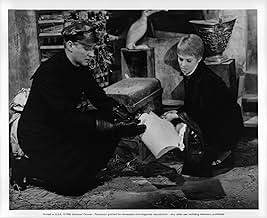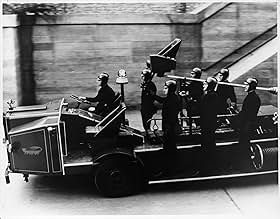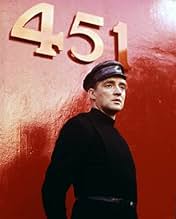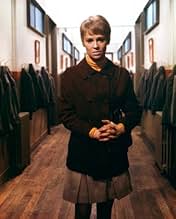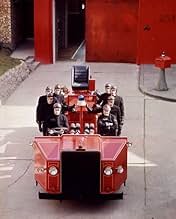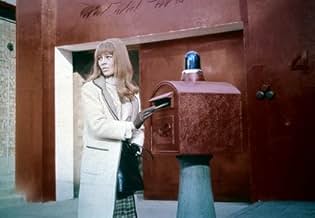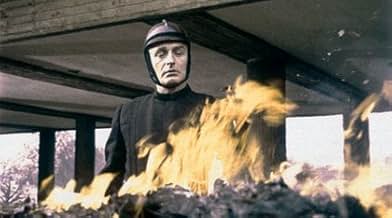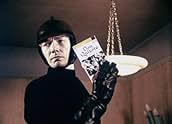In an oppressive future, a fireman whose duty is to destroy all books begins to question his task.In an oppressive future, a fireman whose duty is to destroy all books begins to question his task.In an oppressive future, a fireman whose duty is to destroy all books begins to question his task.
- Nominated for 1 BAFTA Award
- 1 win & 4 nominations total
Gillian Aldam
- Judoka Woman
- (uncredited)
Alfie Bass
- Book Person: 'The Prince'
- (uncredited)
Yvonne Blake
- Book Person: 'The Jewish Question'
- (uncredited)
Arthur Cox
- Male Nurse
- (uncredited)
Frank Cox
- Book Person: 'Prejudice'
- (uncredited)
Fred Cox
- Book Person: 'Pride'
- (uncredited)
Noel Davis
- Cousin Midge - TV Personality
- (uncredited)
Judith Drinan
- Book Person - Plato's 'Republic'
- (uncredited)
Kevin Eldon
- Robert - First Schoolboy
- (uncredited)
7.247K
1
2
3
4
5
6
7
8
9
10
Featured reviews
Reading Is Bad For Children And Other Living Things
Ray Bradbury's disturbing vision of a possible future comes vividly alive in this film adaption of Fahrenheit 451. Reading for pleasure is now banned although I imagine you must have a certain degree of literacy to read food can labels and directions to operate all kinds of machinery. But read for enjoyment or for education about the world beyond the small space of earth you frequent, that's a big no-no in this future America.
Oskar Werner stars in Fahrenheit 451, he plays a fireman who have a different function in this society. Buildings and such are now fireproof so fireman have become the enforcers of the ban against books. They seek and burn books in whatever quantities they find. A good job in a police state, but not a good one if you have an inquiring mind such as Werner has.
Julie Christie plays two roles, Werner's pleasure driven wife and a schoolteacher whose unorthodox for that society's teaching methods have brought her under scrutiny. She does a good job in both characterizations.
Bradbury's themes are grounded in reality. Looking at American history it was a crime in many slave holding states to educate a slave. Let them be happy in their ignorance and they might not get ideas about a better life and won't rebel.
But this is a society that's beyond that kind of formal slavery so the answer is the old Roman one of bread&circuses. The circus in this case is television which has evolved into an interactive medium. The vast wasteland that Newton Minow characterized television as back in the day has gone beyond anything Minow was having visions about. Entertainment has really dumbed down and the circuses aren't too far from what used to entertain the Romans.
In the supporting cast you will remember Cyril Cusack as the fire brigade captain who functions as the spokesman for this new world and Bee Duffring as the book lady who martyrs herself for knowledge in an unforgettable scene.
The ending is not Bradbury's, but one written by director Francois Truffaut. It is very much however in the spirit of the novel and a tribute to mankind's unquenchable thirst for knowledge. Don't miss Fahrenheit 451 when broadcast.
Oskar Werner stars in Fahrenheit 451, he plays a fireman who have a different function in this society. Buildings and such are now fireproof so fireman have become the enforcers of the ban against books. They seek and burn books in whatever quantities they find. A good job in a police state, but not a good one if you have an inquiring mind such as Werner has.
Julie Christie plays two roles, Werner's pleasure driven wife and a schoolteacher whose unorthodox for that society's teaching methods have brought her under scrutiny. She does a good job in both characterizations.
Bradbury's themes are grounded in reality. Looking at American history it was a crime in many slave holding states to educate a slave. Let them be happy in their ignorance and they might not get ideas about a better life and won't rebel.
But this is a society that's beyond that kind of formal slavery so the answer is the old Roman one of bread&circuses. The circus in this case is television which has evolved into an interactive medium. The vast wasteland that Newton Minow characterized television as back in the day has gone beyond anything Minow was having visions about. Entertainment has really dumbed down and the circuses aren't too far from what used to entertain the Romans.
In the supporting cast you will remember Cyril Cusack as the fire brigade captain who functions as the spokesman for this new world and Bee Duffring as the book lady who martyrs herself for knowledge in an unforgettable scene.
The ending is not Bradbury's, but one written by director Francois Truffaut. It is very much however in the spirit of the novel and a tribute to mankind's unquenchable thirst for knowledge. Don't miss Fahrenheit 451 when broadcast.
Naive but also increasingly important
A film about the deliberate dumbing down and control of the populace using information control is perhaps more relevant than ever but Fahrenheit 451 also shows it's age in many parts and the conclusion doesn't feel right to my sensibilities.
Even so it's a story worth knowing and still an effective - though at times glacially paced - film.
The acting is passable. It follows the rather stilted form common at the time but it still conveys the story well and since the characters are supposed to be emotionless and controlled it's also fairly effective.
All in all I would recommend anyone to see it. It's not as impactful as 1984 but still a classic story that should be remembered.
Even so it's a story worth knowing and still an effective - though at times glacially paced - film.
The acting is passable. It follows the rather stilted form common at the time but it still conveys the story well and since the characters are supposed to be emotionless and controlled it's also fairly effective.
All in all I would recommend anyone to see it. It's not as impactful as 1984 but still a classic story that should be remembered.
An excellent adaptation of a great novel.
In a future where books have been outlawed, firemen are paid to burn books instead of put fires out. However, one fireman realizes that what he is doing is wrong and decides to go against the degenerate society he lives in.
I have read reviews of this movie calling it "boring" and "outdated," and frankly I am amazed by how ignorant some people can be. Calling "Fahrenheit 451" outdated simply because the set designs look old and because there are no flashy computer effects shows that you have completely missed the point. The people who made this were not trying to give you a spectacle, they were trying to give you a message - a message that is even more important today than it was when this movie came out.
"Fahrenheit 451" is a fine adaptation of Ray Bradbury's classic novel about censorship. The movie changes many of the book's events, but the spirit of the book is preserved. The cinematography is truly great and the score is quite powerful. The acting is also great. Oskar Werner is right on the money as Montag the fireman. Julie Christie is wonderful playing dual roles as yin and yang: Montag's zombie-like wife, Linda, and Montag's friend, the young and energetic Clarisse. Cyril Cusack is also memorable as the evil Fire Captain Beatty - he isn't a cartoon villain, but a very realistic and human character.
You may think that "Fahrenheit 451" delivers an irrelevant message. You may think that book burning is a thing of the past, a relic of Nazi Germany and Communist Russia. Look around you - book burning happens every day! How do you feel about people trying to ban "The Adventures of Huckleberry Finn" because the word "nigger" is used in it? How about whole sections of "Doctor Dolittle" being rewritten so that they are politically correct? Did you know that school textbooks may not make any mention of Mount Rushmore because it is offensive to a certain Indian tribe? Meanwhile, we are watching our giant-screen TVs and listening to our Walkmans (two inventions that were predicted by Bradbury). We are constantly "plugged in" and never take any time to just sit and think. Look around you - Ray Bradbury's story is coming true. I advise you to watch this movie, and to read the book. (Read the book first. You will appreciate the film more.)
I hear that a remake is in the works. No doubt it will be filled with gaudy special effects and silly Hollywood cliches. I guess I should hold off judgment until I actually see it, but I doubt that it will contain any of the genius that can be found in this sadly underrated gem. It will be interesting to see what they do with the mechanical hound, though....
I have read reviews of this movie calling it "boring" and "outdated," and frankly I am amazed by how ignorant some people can be. Calling "Fahrenheit 451" outdated simply because the set designs look old and because there are no flashy computer effects shows that you have completely missed the point. The people who made this were not trying to give you a spectacle, they were trying to give you a message - a message that is even more important today than it was when this movie came out.
"Fahrenheit 451" is a fine adaptation of Ray Bradbury's classic novel about censorship. The movie changes many of the book's events, but the spirit of the book is preserved. The cinematography is truly great and the score is quite powerful. The acting is also great. Oskar Werner is right on the money as Montag the fireman. Julie Christie is wonderful playing dual roles as yin and yang: Montag's zombie-like wife, Linda, and Montag's friend, the young and energetic Clarisse. Cyril Cusack is also memorable as the evil Fire Captain Beatty - he isn't a cartoon villain, but a very realistic and human character.
You may think that "Fahrenheit 451" delivers an irrelevant message. You may think that book burning is a thing of the past, a relic of Nazi Germany and Communist Russia. Look around you - book burning happens every day! How do you feel about people trying to ban "The Adventures of Huckleberry Finn" because the word "nigger" is used in it? How about whole sections of "Doctor Dolittle" being rewritten so that they are politically correct? Did you know that school textbooks may not make any mention of Mount Rushmore because it is offensive to a certain Indian tribe? Meanwhile, we are watching our giant-screen TVs and listening to our Walkmans (two inventions that were predicted by Bradbury). We are constantly "plugged in" and never take any time to just sit and think. Look around you - Ray Bradbury's story is coming true. I advise you to watch this movie, and to read the book. (Read the book first. You will appreciate the film more.)
I hear that a remake is in the works. No doubt it will be filled with gaudy special effects and silly Hollywood cliches. I guess I should hold off judgment until I actually see it, but I doubt that it will contain any of the genius that can be found in this sadly underrated gem. It will be interesting to see what they do with the mechanical hound, though....
Engrossing, underrated sci-fi
From Ray Bradbury's novel about totalitarian society that has banned books and printed words in order to eliminate independent thought; Oskar Werner plays professional book-burner who becomes enraptured with stories. Possibly a bit too thin at this length, but a fascinating peek at a cold future (which the times have just about caught up to). Didn't get a warm reception from critics in its day, yet the performances by Werner and Julie Christie (in a dual role as both Werner's wife and a rebel acquaintance) are top notch. I was never a fan of director François Truffaut's too-precious stories of childhood, but this film, curiously his only English-language picture, is extremely well-directed; the sequence with the woman and her books afire is one amazing set-piece, with tight editing, incredible and precise art direction, and the camera in all the right places. Truffaut lets you feel the agony of book paper curling up black in a mass of orange flames, and the proud defiance of the woman as she herself strikes the match. Unforgettable. *** from ****
Reading is fundamental
After reading several whinny comments about how the movie is so different from the book I just had to add my two cents. Hello people! These are two different mediums here, like comparing Katherine Hepburn to Audrey Hepburn. They are two different entities which stand alone on their own merits.
I read the book years and years ago, and frankly, I don't remember much about it. I'd seen the movie in years past, and it never knocked my socks off. But upon viewing it last night, I have to say I found myself thoroughly engrossed in it. The scene in the monorail where all the passengers are trying to stimulate themselves through their sense of touch is quite moving. As is the neighbor who declares, "They aren't like us, are they?"
It's never going to be a movie in which you want to see over and over again (like the fluffy Wizard of Oz, again a book that is totally different from the movie, where are the complaining people now?) but it's a movie that should be seen. I also wonder how many people will complain when the new version comes out? I can hear them now, "The first movie was so much better!"
I read the book years and years ago, and frankly, I don't remember much about it. I'd seen the movie in years past, and it never knocked my socks off. But upon viewing it last night, I have to say I found myself thoroughly engrossed in it. The scene in the monorail where all the passengers are trying to stimulate themselves through their sense of touch is quite moving. As is the neighbor who declares, "They aren't like us, are they?"
It's never going to be a movie in which you want to see over and over again (like the fluffy Wizard of Oz, again a book that is totally different from the movie, where are the complaining people now?) but it's a movie that should be seen. I also wonder how many people will complain when the new version comes out? I can hear them now, "The first movie was so much better!"
Did you know
- TriviaThe film's credits are spoken, not read, in keeping with the film's theme of destruction of reading material.
- GoofsAfter Montag comes out of the first raid to burn the books, the placement of the fire protective clothing (helmet and gloves) are unnatural movements and appear to be a reverse run of film footage. This is further compounded by the fact that he walks backwards to get the flamethrower which has flame entering the nozzle instead of leaving the nozzle.
- Quotes
Guy Montag: To learn how to find, one must first learn how to hide.
- Crazy creditsThe beginning credits are spoken instead of written on the screen.
- Alternate versionsOriginally Noel Davis (who plays Cousin Midge) did the opening voice over. In the current version it is done by Alex Scott ("The Life of Henry Brulard" Book Person).
- ConnectionsFeatured in Night Gallery: The Different Ones/Tell David.../Logoda's Heads (1971)
- How long is Fahrenheit 451?Powered by Alexa
Details
- Release date
- Country of origin
- Official sites
- Languages
- Also known as
- Farenhajt 451
- Filming locations
- Châteauneuf-sur-Loire, Loiret, France(Monorail)
- Production companies
- See more company credits at IMDbPro
Box office
- Budget
- $1,500,000 (estimated)
- Gross US & Canada
- $509
- Opening weekend US & Canada
- $11,206
- Apr 25, 1999
- Gross worldwide
- $581
- Runtime
- 1h 52m(112 min)
- Aspect ratio
- 1.66 : 1
Contribute to this page
Suggest an edit or add missing content


